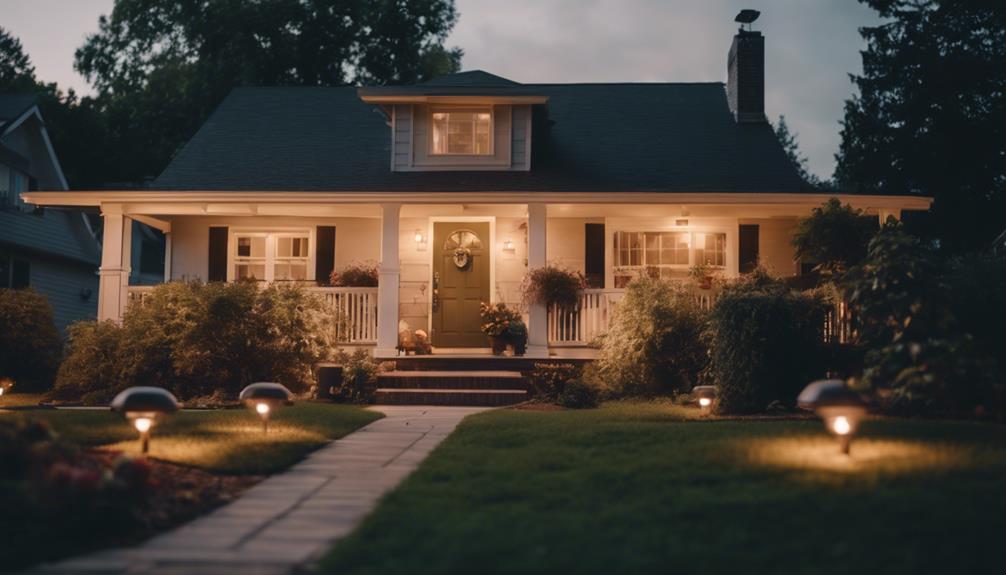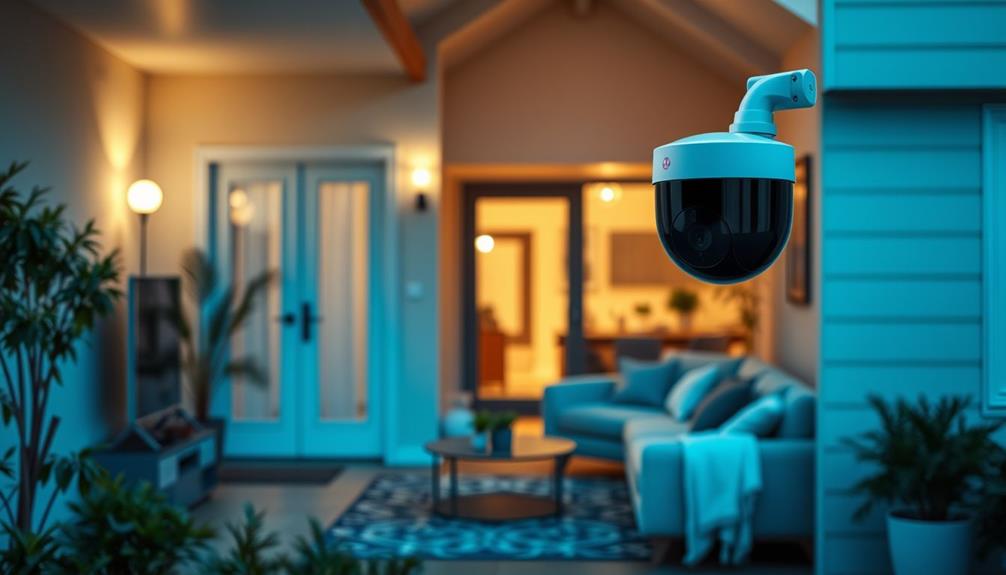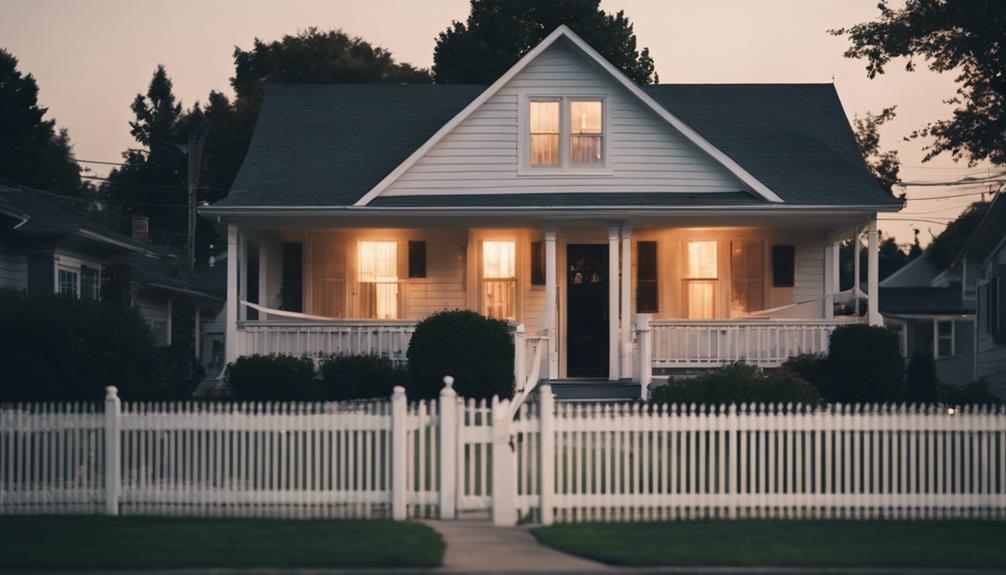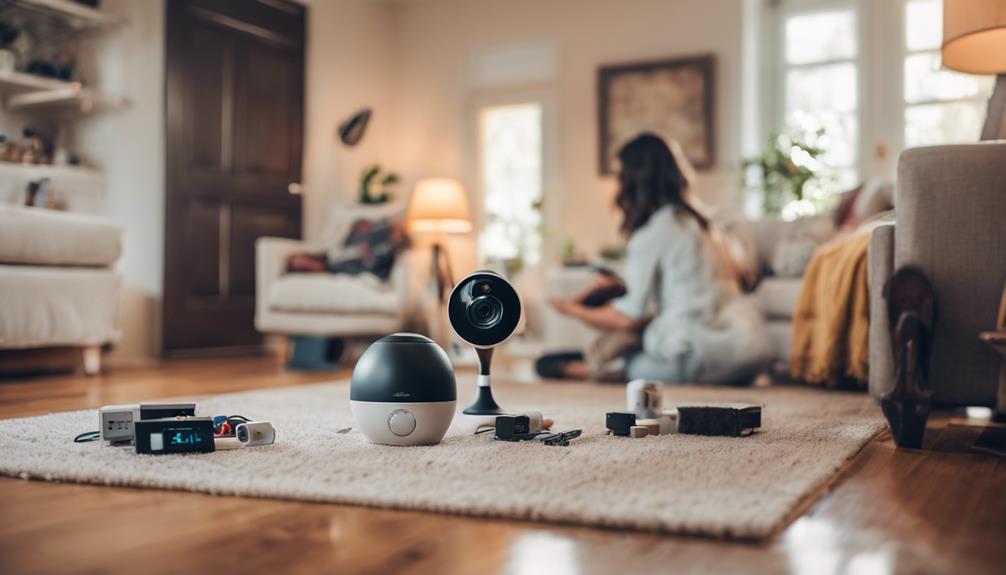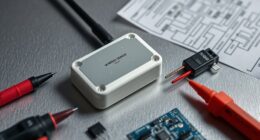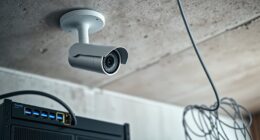There are various types of home security systems available to protect your home from different threats. Burglar alarms can monitor entry points and deter intruders, while fire and smoke detectors can alert you early in case of a fire. Carbon monoxide detectors are also important for keeping you safe from harmful gas. Video surveillance systems provide real-time monitoring and recorded evidence, giving you peace of mind. Environmental sensors can detect flooding and extreme temperature changes to help safeguard your property. You can choose between DIY or professional monitoring options based on your specific needs. If you want to learn more about how to select the best system for your home, there is plenty more information to discover!
Key Takeaways
- Burglar Alarms: Monitor unauthorized access via doors and windows, deterring potential intruders with alert notifications and remote monitoring capabilities.
- Fire and Smoke Detectors: Essential for early fire alerts, recommended for every room, particularly near sleeping areas, to enhance safety.
- Carbon Monoxide Detectors: Vital for detecting toxic gas presence; should be installed on every level for comprehensive monitoring and quick evacuation.
- Video Surveillance Systems: Allow real-time property monitoring with remote access to live footage and recorded evidence, acting as a deterrent against crime.
Overview of Home Security Systems
Home security systems are designed to protect your home from burglaries and theft, using a variety of components like sensors and cameras. These systems typically include entryway sensors and security cameras, helping you monitor your property effectively.
With the rise of cyber threats, it's important to take into account how cybersecurity measures can complement your home security systems. Many people appreciate the option of DIY installation, allowing them to set up their alarm system without needing professional help. However, if you prefer, you can opt for professional monitoring services that provide 24/7 surveillance, giving you peace of mind.
Modern home security systems often come equipped with smart home features, integrating seamlessly with your home automation devices. Video doorbells let you see who's at your door, while environmental sensors can alert you to potential hazards like smoke or carbon monoxide. By using smart home automation, you can control your security features remotely, enhancing your overall safety.
Whether you choose a DIY approach or professional installation, investing in a robust home security system is essential in safeguarding your home. With the right combination of security cameras, entryway sensors, and smart technology, you can greatly reduce the risks of burglary and guarantee a secure environment for you and your family.
Burglar Alarms Explained

Burglar alarms play an essential role in protecting your home by monitoring unauthorized access through doors, windows, and motion detectors. These systems are designed to differentiate between pets and intruders, ensuring accurate responses to potential threats.
When you install burglar alarms, you create an additional layer of security that can deter burglars. Studies show that homes equipped with alarms are considerably less likely to be targeted for theft, which aligns with the trend of increasing security measures in consumer preferences. Additionally, understanding the importance of security in payment processing can further emphasize the need for robust home security solutions.
Modern systems often feature remote monitoring, allowing you to keep an eye on your property from your mobile device. You'll receive alert notifications whenever the alarm is triggered, giving you peace of mind whether you're home or away.
These systems not only help in preventing theft but also can lead to lower insurance premiums. Many insurance companies recognize the effectiveness of burglar alarms and offer reduced rates for homes that have them installed.
For extensive protection, consider incorporating alarm screens to safeguard open windows from tampering. By investing in a robust security system, you're taking a proactive step toward keeping your home safe and secure.
Fire and Smoke Detectors

Fire safety is essential for protecting your home and loved ones.
You should consider the different types of smoke detectors available to guarantee maximum safety in every room.
Key factors in choosing a home cleaning service also apply to making certain your home is well-maintained and free from hazards.Importance of Fire Safety
Ensuring safety in your home starts with the essential role of fire alarms and smoke detectors, which provide early alerts that can save lives during a fire. When you install these devices, you greatly increase your chances of a safe evacuation, thereby reducing the risk of fire-related fatalities.
For extensive coverage, it's recommended to place smoke detectors in every room, especially near sleeping areas. Additionally, maintaining good indoor air quality can complement your fire safety measures, as air purifiers improve indoor air quality considerably.
Regular maintenance is important; perform battery checks every six months to guarantee they function properly. This prevents false alarms and assures you receive timely warnings. Studies show that homes equipped with smoke detectors are more than twice as likely to survive a fire incident compared to those without them.
Consider investing in modern smoke detectors with interconnected systems. When one alarm is triggered, all alarms in your home sound, providing immediate alerts throughout the entire space. This interconnectedness enhances your fire safety and allows you to respond quickly in an emergency.
Types of Detectors
Understanding the various types of detectors is crucial for enhancing your home's fire safety. Smoke detectors and fire alarms are your first line of defense, providing early alerts to help protect you and your loved ones. The National Fire Protection Association (NFPA) emphasizes that working smoke alarms can reduce the risk of dying in a home fire by 50%.
To guarantee thorough coverage, install smoke detectors in every room and utilize interconnected systems so that if one alarm goes off, they all sound. Many modern detectors come with smart technology, allowing notifications to be sent directly to your mobile devices. Features like voice alerts can provide clear instructions during emergencies, making it easier for everyone to respond quickly.
Regular maintenance is crucial; check batteries every six months and replace detectors every 10 years to maintain peak functionality. Below is a comparison of different types of detectors:
| Detector Type | Key Features |
|---|---|
| Ionization Smoke Detector | Fast response to flaming fires |
| Photoelectric Smoke Detector | Better for smoldering fires |
| Combination Detector | Features both ionization and photoelectric technology |
| Smart Smoke Detector | Connects to mobile devices, voice alerts, and interconnectivity |
Importance of Carbon Monoxide Detectors

Carbon monoxide detectors are essential for keeping your home safe from the dangers of this invisible, toxic gas that can stem from everyday appliances.
Installing carbon monoxide detectors on every level of your home provides thorough monitoring, greatly enhancing your overall safety.
**Home security systems** often include these detectors in their home automation systems, offering a streamlined way to detect and respond to this hazard.Regular maintenance is important for ensuring these detectors function effectively. Checking batteries every six months can make a difference in their reliability.
Many modern carbon monoxide detectors come equipped with features that provide early alerts, allowing you and your family to evacuate quickly and reduce the risk of severe health consequences.
A well-implemented home security system guide will highlight the importance of including carbon monoxide detectors in your home security setup.
By investing in a monitoring service that includes these detectors, you're taking a significant step toward protecting your loved ones.
Don't underestimate the risks associated with carbon monoxide; prioritize its detection to safeguard your family's health and safety.
Benefits of Video Surveillance

Video surveillance systems offer homeowners peace of mind by providing real-time monitoring and recorded evidence of activities around their property.
With the ability to view live footage from your phone or tablet through remote viewing, you can keep an eye on your home no matter where you are. This feature is especially beneficial during vacations or long workdays, allowing you to respond quickly to any suspicious activity.
Moreover, the integration of smart technology into home security systems can enhance security measures even more, similar to how breathtaking destinations promise adventure and luxury in travel.
The presence of video surveillance cameras acts as a deterrent to potential intruders, greatly reducing the chances of burglaries and vandalism.
Advanced features like motion detection and alerts guarantee you're immediately notified of any unusual movements around your property, additionally enhancing your personal security.
Also, incorporating video doorbells into your surveillance system allows you to identify visitors before opening the door, adding another layer of protection.
You can easily screen who approaches your home, making it harder for unwanted guests to catch you off guard.
To conclude, video surveillance not only keeps you informed but also helps create a safer environment, giving you the confidence to enjoy your home without constant worry.
Role of Environmental Sensors

How can environmental sensors transform your home into a safer haven by detecting potential threats before they escalate? These sensors are essential for homeowners who want to enhance home safety and guarantee thorough protection against environmental hazards. By integrating with security systems, environmental sensors provide an extra layer of monitoring that helps you intervene promptly.
| Type of Sensor | Purpose |
|---|---|
| Flood Sensors | Detect unusual water levels from leaks or heavy rain, alerting you to take action. |
| Temperature Sensors | Monitor home temperature to prevent burst pipes or spoilage of food. |
| Smoke Detectors | Identify smoke, providing early warnings of fire hazards. |
| Carbon Monoxide Detectors | Detect harmful gas levels, assuring your family's safety. |
| Humidity Sensors | Monitor moisture levels to prevent mold growth and maintain air quality. |
Regular maintenance of these sensors is essential for their effectiveness. By staying proactive and utilizing environmental sensors, you can implement preventative measures that safeguard your home and loved ones from unexpected threats.
Understanding Monitored Security Systems

Monitored security systems provide peace of mind by allowing you to keep an eye on your home from anywhere, thanks to remote monitoring via smartphones.
With these systems, you'll receive instant alerts for any security breaches or unusual activity, enabling you to act quickly.
Most monitored systems require professional installation, ensuring that sensors and cameras are set up correctly for peak performance.
Additionally, effective keyword clustering within your content can help users find relevant information about these systems more easily.
You can expect to pay monthly fees ranging from $19.99 to $45.99, depending on your provider and the level of service, which typically includes 24/7 monitoring.
This means there's always someone watching over your home, ready to contact emergency services if needed.
Many monitored security systems also offer smart home integration, allowing you to control various devices through a single app.
This kind of home automation enhances your security features, letting you lock doors, adjust lights, and monitor cameras all in one place.
Choosing the Right Security System

Choosing the right security system involves evaluating your unique needs and budget to guarantee you get the best protection for your home.
Start by considering the various security solutions available and how they align with your protection needs. For instance, staying informed about current security trends and issues can help you make a more informed decision.
Here are some key factors to help you decide:
- Budget: Determine how much you're willing to spend on both the initial setup and ongoing costs, like professional monitoring fees.
- DIY Installation vs. Professional Installation: Decide whether you want to install the system yourself for flexibility or choose professional installation for reliability.
- Monitoring Preferences: Think about whether you prefer self-monitoring options or a system that requires professional monitoring contracts.
- Features: Look for systems that include essential components such as motion sensors, burglar alarms, and fire alarms for thorough protection.
Key Features to Consider

When selecting a home security system, it's important to contemplate key features that enhance protection and fit your lifestyle.
First, decide whether you prefer DIY installation, which many systems like SimpliSafe offer, or professional installation, as required by providers like ADT.
Next, evaluate your monitoring options. Some systems provide free self-monitoring, like Ring, while others, including Vivint and ADT, may charge monthly fees for professional monitoring.
Consider the types of sensors included as well; door/window sensors, motion detectors, and environmental sensors for floods or temperature changes greatly boost your security.
Smart home integration is another vital feature. Systems compatible with devices such as Amazon Alexa, Google Assistant, or Apple HomeKit can enhance your home automation experience, allowing for seamless control.
Lastly, assess the cost structure carefully. Look at the initial equipment price alongside any ongoing monthly fees, and consider potential long-term savings through insurance discounts for homes equipped with security systems.
Popular Home Security Options

Home security options come in various forms, each designed to address specific safety needs and enhance your peace of mind. Choosing the right combination of systems can greatly improve your home protection. Here are some popular options to evaluate:
- Burglar Alarms: These systems utilize motion detection and connect to doors and windows for effective intrusion detection.
- Fire Alarms and Smoke Detectors: Essential for early alerts, these devices should be installed in every room and maintained regularly.
- Video Surveillance Systems: With features like remote viewing, these systems allow you to monitor your property in real-time and provide recorded evidence.
- Carbon Monoxide Detectors: Critical for identifying harmful gas, these should be installed on every level of your home for maximum safety.
Frequently Asked Questions
What Are the Three Types of Security Systems?
You'll find three main types of security systems: burglar alarms that deter unauthorized access, fire alarms with smoke detectors for early fire alerts, and video surveillance systems for real-time monitoring and recorded evidence of activities.
What Type of Security System Is the Best?
The best security system for you combines multiple components like alarms, cameras, and monitoring services. It should integrate smart technology, allowing remote control and customization to fit your unique needs, ensuring maximum protection and convenience.
Which Home Security System Is Easiest to Install?
Imagine swiftly mounting a camera, feeling empowered as you secure your home. For easy installations, consider DIY systems like SimpliSafe or Ring Alarm; they're designed for you, requiring minimal time and technical know-how.
What Are the Three Main Types of Alarm Systems?
You'll find three main types of alarm systems: burglar alarms for unauthorized entry, fire alarms for smoke detection, and carbon monoxide detectors to alert you of hazardous gas. Each plays an essential role in home safety.
What Are the Most Common Types of Home Security Systems?
When it comes to ensuring the safety of your home, there are several home security system essentials to consider. The most common types of home security systems include alarm systems, surveillance cameras, and smart locks. These are essential components for protecting your home and providing peace of mind.
Conclusion
As you consider your home security options, remember that the right system could be the difference between safety and vulnerability.
With various choices, from burglar alarms to video surveillance, it's essential to weigh your needs carefully.
What if a simple decision could protect your loved ones and belongings from unforeseen threats?
Don't wait until it's too late—take action now to secure your peace of mind and guarantee your home is as safe as it can be.


